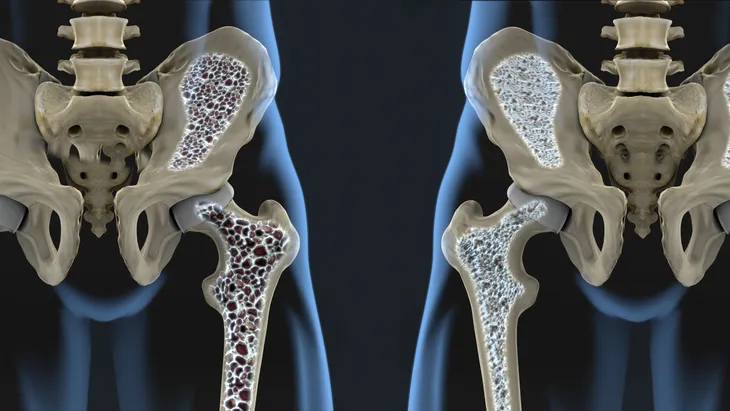The signs and symptoms of magnesium deficiency are vast. Some are subtle, while others can cause serious health problems. Many people who have a deficiency don’t even know it, and a lot of health issues are blamed on something else or remain unexplained as a potential magnesium deficiency is overlooked.
You can have a magnesium deficiency if you don’t consume enough of the nutrient in your diet or if your body doesn’t absorb enough when it goes through your system. Other things, such as consuming too much alcohol and certain medications, can also deplete your body’s magnesium. Magnesium plays an integral role in your body’s ability to keep your heart, kidneys, and muscles healthy. It also regulates nutrient levels and keeps bones strong. Since this mineral is so important, it’s best to stay on top of these 20 warning signs of magnesium deficiency…
1. Fatigue
Being tired and feeling lethargic is not uncommon, and it can be easy to blame fatigue on several factors from stress at work or a busy schedule to not sleeping well or running around with your kids. But, one of the most common and early symptoms of a magnesium deficiency is fatigue. Because just about everyone feels tired at some point and the cause could be from so many different things, it’s difficult to come to the correct diagnosis. A magnesium deficiency likely isn’t the first thing your doctor is going to check, and unfortunately, the fatigue won’t go away until your body gets the right amount of magnesium in it.
Since magnesium helps produce and transport energy, an insufficient level can easily result in feeling tired and weak. To keep your energy levels where they should be, you need to be getting enough magnesium. If you aren’t low in magnesium but experience fatigue often, sometimes magnesium supplements can be used to relieve fatigue. Talk to your doctor before starting any new supplements.

2. Muscle Spasms and Cramps
Muscle spasms and cramping are not only uncomfortable but also quite painful. They’re uncontrollable and unpredictable and not something you can simply ignore and get on with your day. While athletes often suffer from muscle cramps due to inadequate stretching, dehydration, overexertion, and lack of proper diet, many other people suffer from them. As a result, it can be hard to figure out why and how to prevent them. When a magnesium deficiency worsens, muscle spasms and cramping can be a sign of the deficiency. So, if you suffer from regular cramping and spasms, this could be a warning sign of low magnesium levels.
While getting your magnesium levels to where they should be will likely ease your symptoms, you can try to get short-term relief by stretching and massaging the affected muscles. Vitamins D, E and B complex also play roles in preventing muscle cramps, so make sure you get your daily recommended dose of these vitamins to help ward off cramping.

3. Arrhythmia
Magnesium plays a vital role in overall heart health. It’s vital for proper muscle contraction, and a low level can affect your body’s most important muscle — your heart. Arrhythmia is an irregular heartbeat, and magnesium directly helps you maintain a normal heart rhythm. Some studies have shown that maintaining a regular level of magnesium may even prevent some heart problems and diseases, including arrhythmia. In fact, magnesium is often used in medical settings when managing patients with arrhythmias.
There have been a lot of studies focused on how magnesium affects your heart, specifically if it can prevent heart disease or lower the risk of heart attack. While nothing is guaranteed and no heart is the same, some of these studies have shown a positive effect on heart health and prevention of heart disease with an increased magnesium intake. Some doctors even prescribe magnesium for patients who are at risk of cardiac arrhythmia.

4. Dizziness
Sometimes dizziness hits you when you stand up too fast and quickly goes away, but it could be due to a magnesium deficiency. If this is the case, unfortunately it won’t disappear on its own and can last all day without relief. Similar to fatigue, it can be hard for your doctor to diagnose because so many things can cause dizziness. As a result, magnesium deficiency is often overlooked when trying to diagnose and fix the problem. Low magnesium levels can give you similar feelings, such as vertigo, making you feel not only dizzy but also completely off balance. If you’re experiencing dizziness, it could be a warning sign of magnesium deficiency.
As a magnesium deficiency worsens, so do the symptoms. You could experience light and manageable dizziness in the beginning, but it can fully transform into vertigo if your levels continue to decline. Vertigo can completely alter your life. It could make you unable to do regular day-to-day activities and miss work when it’s at its worst. If you’re experiencing dizziness, it’s worth a visit to your doctor.

5. Nausea
Similar to vertigo, if you have a low magnesium level, you may experience nausea. Although these symptoms are considered an early warning sign, they are not necessarily a severe symptom of magnesium deficiency. Constantly feeling nauseous is quite simply unpleasant, even if it isn’t a considered severe symptom, and can greatly impact your routine.
For those who suffer from regular nausea, it’s worth asking your doctor about other potential causes, such as magnesium deficiency. Like many other symptoms, there can be a variety of causes and your magnesium level may be overlooked.

6. Vomiting
Those struggling with a magnesium deficiency often experience bouts of nausea, which can occasionally lead to actually getting sick and vomiting. If you find yourself feeling nauseous and vomiting without knowing the cause, it’s certainly worth consulting a professional and mentioning a potential magnesium deficiency, especially if you have this symptom coupled with any others.
Another possible cause of nausea and vomiting, which is related to magnesium, is that you could experience nausea if your magnesium levels are too high. If you’re taking a magnesium supplement, other supplements and certain types of medication could cause your magnesium levels to spike.

7. Numbness
Magnesium is one of the most abundant and important minerals in your body. It’s responsible for over 300 biochemical reactions, so it’s not hard to believe that having a deficiency can greatly impact your overall health. Since magnesium impacts your nervous system, tingling and numbness can be a warning sign of a deficiency, particularly as it worsens. Without sufficient magnesium in the body, it can prevent nerve and muscle tissue from acting and reacting properly. A lack of magnesium can also prevent your body from sending the proper signals, resulting in numbness and tingling. It’s common to feel these symptoms in your face, feet and hands.
Although severe symptoms such as numbness are rare, experiencing it can be quite scary. Numbness is not something to take lightly, and there are a number of reasons it could be happening, all of which go way beyond a simple magnesium deficiency. It is important to see your doctor and figure out the cause of numbness and/or tingling.

8. Personality Changes
It might seem bizarre and definitely not the first cause you’d jump to, but believe it or not, personality changes are a warning sign of a magnesium deficiency. Significant personality changes, including abnormal amounts of confusion and irritability, can seem to come out of nowhere. Simple things can seem overwhelming and make you feel out of sorts. You’ll likely be able to notice the change but are unsure of how to fix it. Since many things can cause symptoms like this, a magnesium deficiency is often not considered when trying to diagnose personality changes.
On top of these personality changes and periodic mood swings, the lack of sleep discussed earlier could cause a mood change if it happens often, ultimately affecting both your personal and professional relationships. Sleep is vital for your mental, physical and emotional health. So, if a magnesium deficiency is what’s keeping you up at night, it’s important you get your magnesium up to a sufficient and healthy level.

9. Anxiety
Everyone experiences a bout of anxiety or panic once in a while. But if you’re experiencing it regularly, it could be due to a magnesium deficiency. You may be quick to blame everyday stress, but you should also consider the role a magnesium deficiency has in causing anxiety, especially if you aren’t typically prone to panic and anxiety.
Unfortunately, if you’re suffering from anxiety, the stress can dwindle your magnesium levels, making it a vicious cycle. Low magnesium causes anxiety and depletes your magnesium reserves during the attack.

10. Panic Attacks
If your anxiety becomes severe due to a magnesium deficiency, it can even lead to a panic attack. There are a lot of different symptoms of a panic attack, including difficulty breathing, a racing heart, chest pain, an intense rush of fear or dread, and tingling in your limbs and trembling among other uncomfortable and terrible feelings.
Although they typically only last a few minutes, each second can feel like a lifetime and you end up feeling completely emotionally drained. Talk to your doctor if you experience these symptoms, especially if they happen often.

11. Insomnia
Having a magnesium deficiency can cause insomnia in several different ways. As we mentioned earlier in this article, low levels of magnesium can result in muscle spasms. This is because the body needs a sufficient amount of magnesium in order to control electrical conduction in the neurons in the muscles, which will then lead to a prolonged opening of calcium channels and increasing muscular activity. This causes restless leg syndrome, a condition that causes the legs to move involuntarily during the night.
This form of insomnia caused by a magnesium deficiency in indirectly related, but a lack of magnesium is also known to directly cause insomnia as well.

12. High Blood Pressure
A study published in the American Journal of Hypertension conducted an experiment where the correlation between levels of blood pressure and levels of magnesium intake were analyzed. The results were that the individuals with the healthiest blood pressures had the highest levels of magnesium. As a result, those with low levels of magnesium had high blood pressure.
A study published in the American Journal of Clinical Nutrition concluded that eating magnesium rich foods (approximately 100 mg a day) would decrease the risk of having a stroke by 8-percent.

13. Type 2 Diabetes
This symptom sounds strange, but when explained, it actually makes a lot of sense. A study published in the Journal of Internal Medicine found that magnesium plays a significant role in metabolizing glucose (sugar). Since type 2 diabetes is something that develops based on an individual’s diet, a lack of magnesium could play an important role in the development of this condition.
It should be noted that low levels of magnesium are found in pre-existing diabetics, but low levels of magnesium are 10 times higher in individuals that are newly diagnosed with type 2 diabetes. Eating a magnesium rich diet consisting of nuts, whole grains, leafy vegetables and beans could prevent any potential risk of type 2 diabetes.

14. Osteoporosis
A deficiency in magnesium can also increase your risk of developing bone problems such as osteoporosis, “a disease characterized by low bone mass and deterioration of bone tissue, which can lead to increased risk of fracture,” defines Osteoporosis Canada.
There are a couple of reasons for this observation. The first is that the bones store large amounts of magnesium. So when levels of the mineral are low for a prolonged period of time, it can lead to bone loss. Another reason is that a magnesium deficiency can lower the level of calcium in the blood, and calcium is essential to the maintenance of strong bones.

15. Migraines
It’s normal for most individuals to have headaches on occasion. But if you find yourself suffering from them on a regular basis, consider bypassing the painkillers and visiting your doctor about a possible magnesium deficiency.
LiveStrong explains that a magnesium deficiency can cause headaches “due to the dilation of blood vessels” and that “nearly half of the people suffering from migraine headaches are shown to have a low amount of ionized magnesium in their blood.” A blood test will be conducted to confirm the cause and ensure appropriate treatment options are recommended.

16. Constipation
There are a wide variety of reasons you may be experiencing constipation, from stress to inadequate fiber intake to consuming too much dairy. Certainly, having a magnesium deficiency isn’t the first culprit to come to mind, but it may very well be why you’re having trouble passing bowel movements.
Magnesium has a relaxing effect on many parts of the body, including the digestive tract. So if you’re not getting enough of the mineral, these muscles contract more, making it difficult for waste to move through the system and resulting in constipation.

17. Acid Reflux
As previously mentioned, magnesium plays a key role in muscle relaxation throughout the body. This includes the valves at the top and bottom of the stomach, which allow food to move through the body.
However, if you have a magnesium deficiency, NaturalLife.org says these sphincters “cannot properly contain the food,” thus allowing food and stomach acid to flow back into the esophagus. This results in a burning sensation, which is clinically referred to as acid reflux or heartburn. Unfortunately, if the cause of your acid reflux is a magnesium deficiency, the source indicates that most over-the-counter medications can actually worsen these symptoms. So be sure to speak with your doctor before self-medicating to remedy the problem.

18. Decreased Appetite
A loss of appetite is sometimes an early sign of a lack of magnesium. This decreased appetite is often accompanied by fatigue and nausea.
A decreased appetite can also further contribute to a magnesium deficiency even further if you’re unable to eat enough foods that contain magnesium. Foods that are hearty in magnesium that could be good to incorporate into your diet include spinach, legumes, nuts, whole grains, and fortified breakfast cereals.

19. Weakness
A general feeling of weakness is often reported by those who have been diagnosed with a magnesium deficiency. This feeling can often be accompanied by muscle cramps, fatigue, and stiffness as well.
If you feel a generalized sense of weakness in the body, this could be an early sign of a magnesium deficiency and could be worth consulting a doctor if symptoms don’t disappear within a few days.

20. Seizure
One of the more severe symptoms of magnesium deficiency is seizures. Low levels of magnesium can alter the electrical activity of brain cells and cause seizures. While this isn’t typically an early or more common symptom of a magnesium deficiency, it is a possibility if action isn’t taken.
If you notice some of the more mild symptoms of a magnesium deficiency, it’s important to consider incorporating a supplement or consulting your doctor.




